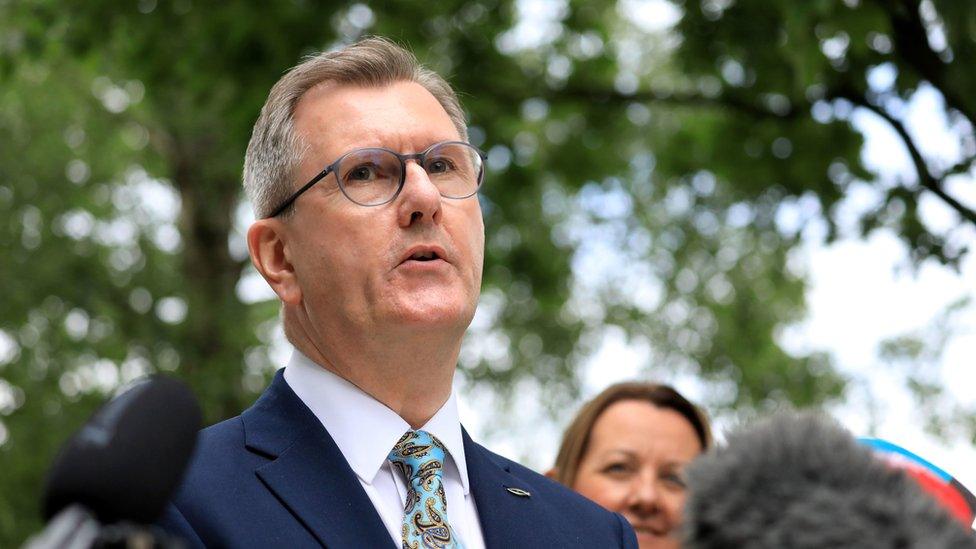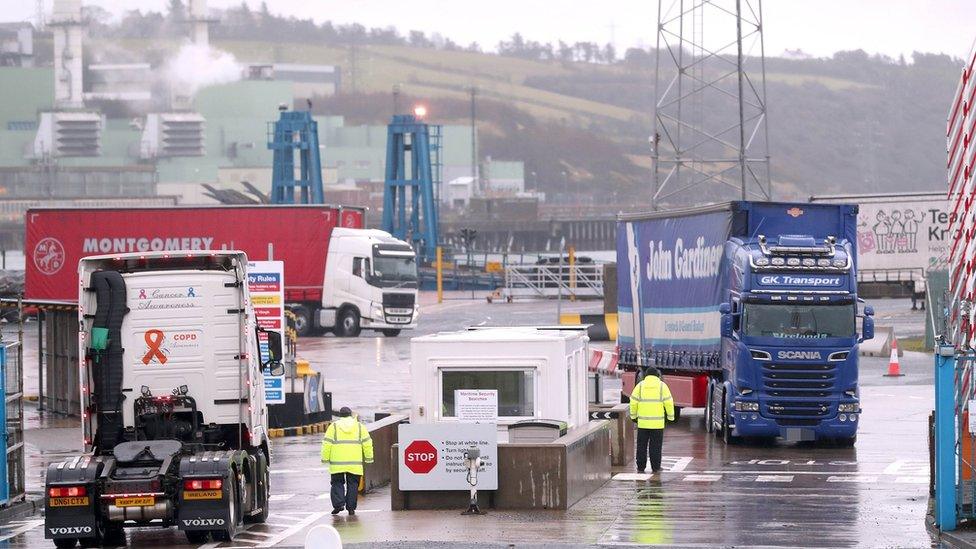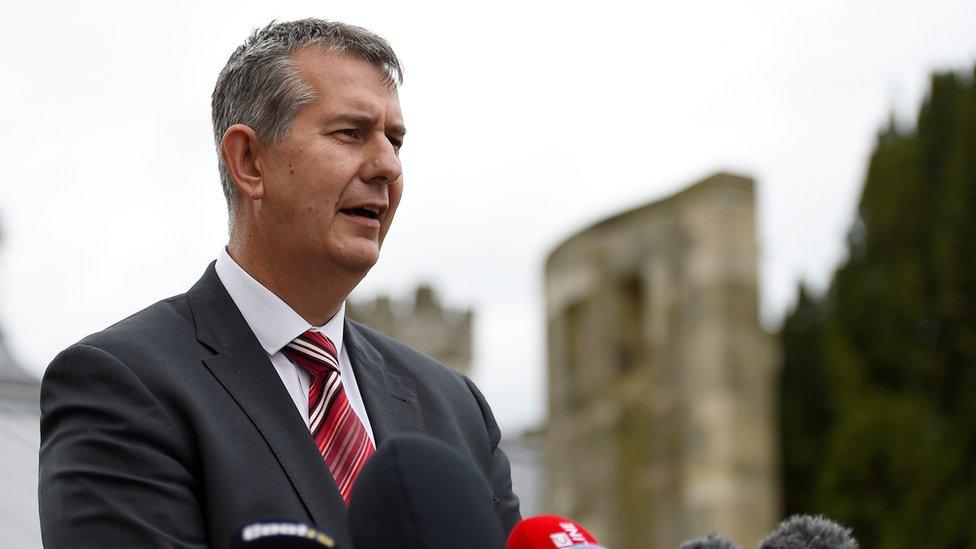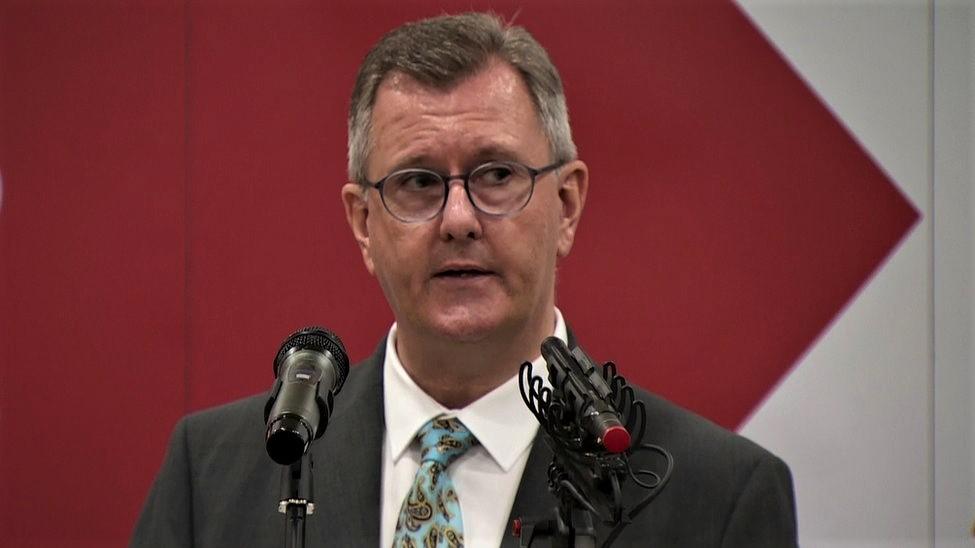NI Protocol: DUP boycott of north-south meetings 'unlawful'
- Published

Protests against the protocol have taken place across Northern Ireland
The Democratic Unionist Party's boycott of North-South Ministerial (NSMC) meetings in protest at the Northern Ireland Protocol is an unlawful breach of the pledge of office, a High Court judge has ruled.
Mr Justice Scoffield made the declaration at Belfast High Court after judicial review proceedings were taken.
The protocol is part of the Brexit deal agreed in 2019.
Unionists argue it undermines Northern Ireland's position as part of the UK.
Two NMSC meetings have been cancelled, with further meetings scheduled for later this week.
The case centred around DUP leader Sir Jeffrey Donaldson's announcement in September that his party would disengage with the NSMC meetings as part of their campaign of opposition to the protocol.

Sir Jeffrey Donaldson previously described the protocol as a roadblock
Mr Justice Scoffield said: "The respondents' decision to withdraw from the North South Ministerial Council was and is unlawful.
"It frustrates, is contrary to and is in breach of legal duties contained in the Northern Ireland Act."
He said the declaration had been agreed by legal counsel for both the applicant and the respondents.
Five DUP ministers were named as respondents in the case, which was taken by Sean Napier, from Belfast.
They are First Minister Paul Givan, junior minister at the Executive Office Gary Middleton, Education Minister Michelle McIlveen, Agriculture Minister Edwin Poots and Economy Minister Gordon Lyons.
The judge said Northern Ireland Executive ministers were required to affirm the pledge of office, set out as part of the Northern Ireland Executive Ministerial Code.
He said this included a commitment to participate in the North South Ministerial Council and the British Irish Council.
A DUP spokesman said Monday's judgment proved conditions to trigger Article 16 have been met.
Article 16 of the protocol sets out the process for taking unilateral "safeguard" measures if either the EU or UK concludes that the operation of the deal is leading to serious problems.
"If an early resolution between the UK and EU cannot be achieved, we call upon the UK government to invoke the terms of Article 16 to avoid a further deterioration in political and economic stability in Northern Ireland," the DUP spokesperson said.
Deputy First Minister Michelle O'Neill tweeted to say ministers needed to "do their jobs".
She said €1billion of PeacePlus funding was at stake.
Allow X content?
This article contains content provided by X. We ask for your permission before anything is loaded, as they may be using cookies and other technologies. You may want to read X’s cookie policy, external and privacy policy, external before accepting. To view this content choose ‘accept and continue’.
Infrastructure Minister Nichola Mallon said the DUP's absence at north-south meetings has been "intemperate, ill-considered and has now been confirmed as unlawful".
"The politics of boycott, division and deadlock has failed people and politics here for far too long," she said.
Ms Mallon said it is time now for DUP's ministers "to commit to upholding their legal obligations".

Infrastructure Minister Nichola Mallon said the DUP must uphold their legal obligations
Alliance MLA Stewart Dickson said the judge's ruling gave the DUP the "space and grace to return to the task to which they were elected".
"The reality is that they gave an obligation under the Good Friday Agreement, it's part of their ministerial code of office that they participate in these proceedings," he said.
He also told Radio Ulster's Evening Extra that nearly £1bn of peace funding was at risk.
"Their [the DUP's] absence [from North/South meetings] would mean it would go into abeyance and it might even put the funding into jeopardy."
Legal obligations
Mr Justice Scoffield said the court expected the respondents to comply with their legal obligations.
He said he would not take any further action at the moment, but said if there was no change to the situation the applicant could return to court.
"It is difficult for the court to reach any other conclusion than that the respondents have consciously determined to act in contravention of the pledge of office and the ministerial code," he added.
"It is perhaps worth emphasising the each minister of the Northern Ireland Executive bears personal responsibility to comply with the pledge of office and the ministerial code.
"The court obviously possesses further powers, but in my view, it would be a sorry spectacle for those powers to have to be invoked."
Mr Napier's lawyers had argued the decision to boycott the meetings is frustrating the function of government and could jeopardise peace funding.
They also argued that the policy breached constitutional arrangements under the Northern Ireland Act 1998 and violated the Stormont ministerial code and the pledge of office.
Related topics
- Published30 July 2021

- Published12 May 2021

- Published9 September 2021
